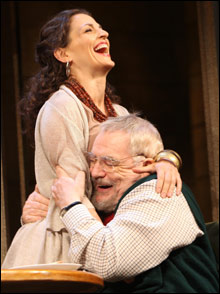
THEY GET YOU ROCKING: Nicole Ansari and Brian Cox are just part of what makes Stoppard’s show worth the trip to New York. |
NEW YORK — Tom Stoppard’s Rock ’n’ Roll begins in 1968 in an English garden, where a curly-haired piper perched atop an ivied wall is serenading a stretched-out blonde flower child. The piper is playing “Golden Hair,” and he may be the just-divorced-from-Pink-Floyd Syd Barrett. But to Esme, the stoned 16-year-old recipient of the musician’s darting tribute, he is Pan, the goat-footed Greek god partial to sex and loud music — an apt mascot for this dizzying brain fest linking repression, revolution, and rock. Stoppard’s plays are never simple, and this new one wraps itself around two fraught decades of Czech history, from the Prague Spring to the Velvet Revolution, throwing in a roaring old bear of a diehard English Communist, a fiery dust-up between Eros and brain science, exhilarating bursts of the title commodity, even a tempering reference to the reclusive Barrett of more recent vintage (he died last year), “an old baldy on a bike” lending credence to Plutarch’s long-ago announcement that “great Pan is dead.”Rock ’n’ Roll opened last year at London’s Royal Court Theatre, with former Czech Republic president Václav Havel, Mick Jagger, and Pink Floyd guitarist David Gilmour in attendance. After transferring to the West End and copping the 2006 Eastern Standard Award for Best Play, it has arrived, bearing its exemplary trio of original stars, for a “limited engagement” (you can buy tickets through March 2) at Broadway’s Bernard B. Jacobs Theatre, from which the audience stumbles after two and three-quarter hours, heads bursting with history, politics, and passion both ideological and romantic, and bodies bouncing to the benedictive strains of “You Got Me Rocking” by the Rolling Stones.
Like Stoppard’s three-part The Coast of Utopia, which traffics in the Russian intelligentsia of the mid 19th century, Rock ’n’ Roll has its academic component. But it’s also a deeply felt and very personal work: one in which Stoppard, born Tomás Straussler in 1937 Czechoslovakia, envisions an alternative biography for himself. Like the pop-music-obsessed playwright, the central character, Jan, is a Czech who was taken from the country as a baby to get out of the way of World War II. But Jan returned to his native land in 1948. We meet him in 1968 as a 29-year-old visiting lecturer and doctoral candidate at England’s Cambridge University. He’s on his way out the door, however, beckoned back to Prague by Soviet tanks looking to wipe the smile off “socialism with a human face.” Whether Jan, an ardent rock geek, is going home to save socialism or the music depends on who’s asking. But there is nothing in his luggage but vinyl.

As Stoppard’s masterpiece, Arcadia, shuttles between centuries, Rock ’n’ Roll rotates between Prague, where Jan slowly moves from accommodation to dissent, and Cambridge, where his academic mentor, cognitive philosopher and unrepentant Commie Max Morrow, suffers the loss of his wife to cancer and the come-uppance of his Marxist-materialist beliefs. During the 22-year course of the play, Communism, to Max’s rumbling distress, goes the way of the dodo, another “system” hoist on the messy petard of its own imperfections — though it should be noted that Stoppard also gets in a few shots at what one character, a Czech émigré, calls England’s “democracy of obedience.”